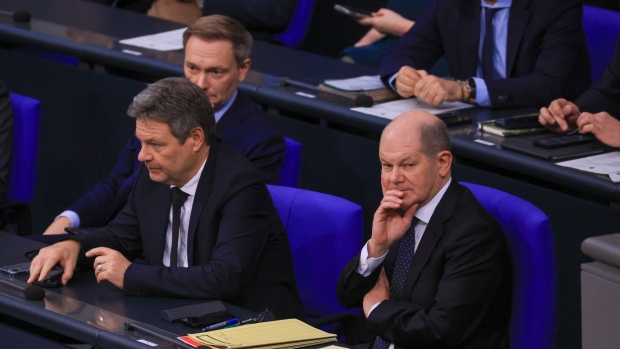Dec 16, 2023
Most Germans Want New Government, Early Elections, Poll Shows
, Bloomberg News

(Bloomberg) -- More than half of German voters are so dissatisfied with Chancellor Olaf Scholz’s coalition government that they want early elections, according to a survey.
The poll for Bild, released on Saturday, showed that 59% of the 1,001 people surveyed would prefer elections for a new German parliament in 2024, while 27% oppose such a move. Regular elections are due in fall 2025.
Scholz’s three-party ruling alliance was forced to overhaul its finance planning by November’s judgment by the country’s top court that curtailed the use of special funds outside the regular federal budget.
The issue ballooned into a political crisis because the use of the funds was critical to bridging differences in the coalition. The off-budget financing was a way to sidestep constitutional rules and still pay for projects like investment in the country’s climate transition.
German lawmakers on Friday backed the government’s move to suspend a constitutional limit on net new borrowing in 2023 for a fourth straight year.
Scholz, a Social Democrat, economy minister Robert Habeck of the Greens, and finance chief Christian Lindner, leader of the Free Democrats, had been haggling over the details, raising questions about the viability of the three-party alliance formed after the 2021 election.
Gemany’s biggest opposition party, the Christian Democrats, wanted Scholz to call a vote of confidence in parliament, which he rejected. If a majority of parliamentarians don’t give the chancellor a vote of confidence he can ask Germany’s president to dissolve the Bundestag and call for early elections.
In a weekly survey conducted for Bild am Sonntag, the Social Democrats, Greens and Free Democrats together had support of only 32% of voters, 20 percentage points less than they captured in the 2021 election and the lowest ever measured by opinion research institute INSA for the three-party coalition.
The Christian Democrats and their Bavarian sister party gained 2 percentage points on the week and also scored 32%.
Scholz’s ruling coalition recently suffered stinging electoral defeats in two key economic powerhouses, piling pressure on Germany’s fractious government in Berlin. All three governing parties shed support in Bavaria and Hesse, home to about a fifth of Germany’s electorate, amid deepening voter frustration.
The far-right Alternative for Germany — known as the AfD — emerged as the second-strongest force in Hesse and ran third in Bavaria, underlining its growing national presence.
(Updates with election poll in eighth paragraph)
©2023 Bloomberg L.P.








